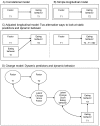Understanding Eating Behavior during the Transition from Adolescence to Young Adulthood: A Literature Review and Perspective on Future Research Directions
- PMID: 29794986
- PMCID: PMC6024552
- DOI: 10.3390/nu10060667
Understanding Eating Behavior during the Transition from Adolescence to Young Adulthood: A Literature Review and Perspective on Future Research Directions
Abstract
Introduction: Eating behavior often becomes unhealthier during the transition from adolescence to young adulthood, but not much is known about the factors that drive this change. We assess the available evidence on this topic through a literature review and pay special attention to the research designs employed in the studies available as well as the modifiability of the factors investigated in previous research.
Method: We systematically conducted a scoping review by searching literature published in or after 2000 in three databases that described one or more factors associated with eating behavior or changes in eating behavior during the transition from adolescence to adulthood in the general population. Our search identified eighteen articles meeting these inclusion criteria. The socio-ecological DONE (Determinants of Nutrition and Eating) framework, a recently developed dynamic framework of factors shaping dietary behavior, was used to structure and categorize the factors identified.
Results: Most factors identified in the literature were individual-level factors (67%) such as food beliefs, time constraints, and taste preferences; on the other hand, interpersonal-level factors (e.g., social support), environmental-level factors (e.g., product characteristics) and policy-level factors (e.g., market regulations) have been reported on less extensively. Furthermore, most factors discussed in the literature have been classified in the DONE framework as not easily modifiable. Moreover, previous studies largely used static research designs and focused primarily on one specific population (US freshmen).
Discussion: This systematic scoping review identified several gaps in the available literature that hinder insight into the drivers of eating behavior (change) during the transition from adolescence to young adulthood. There is an urgent need for research on broader populations, employing dynamic repeated-measures designs, and taking modifiability of factors into account.
Keywords: behavior change; eating behavior; emerging adulthood; life transitions; literature review; weight change.
Conflict of interest statement
The authors declare no conflict of interest. The founding sponsors had no role in the design of the study; in the collection, analyses, or interpretation of data; in the writing of the manuscript, and in the decision to publish the results.
Figures


References
-
- Arnett J.J. Adolescence and Emerging Adulthood: A Cultural Approach. 4th ed. Prentice Hall; Upper Saddle River, NJ, USA: 2010.
-
- Erikson E.H. Identity, Youth, and Crisis. Norton; New York, NY, USA: 1968.
-
- Gall T.L., Evans D.R., Bellerose S. Transitions to first-year university: Patterns of change in adjustment across life domains and time. J. Soc. Clin. Psychol. 2000;19:544–567. doi: 10.1521/jscp.2000.19.4.544. - DOI
Publication types
MeSH terms
LinkOut - more resources
Full Text Sources
Other Literature Sources
Medical

